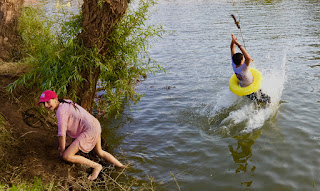How beautiful are your tents, Jacob,
your dwelling places, Israel!
Numbers
24:5
 In the Torah, as the Jews encamped in the
desert, the prophet Bilaam looked at them from a mountaintop and bestowed this
praise.
In the Torah, as the Jews encamped in the
desert, the prophet Bilaam looked at them from a mountaintop and bestowed this
praise.
This very line from the Torah is also said in combination
with a verse from the Psalms to form the prayer ‘Ma Tovu,’ which is said every
day upon arising:
How great are your tents, O Jacob, your
dwelling places, O Israel!
As for me, through Your abundant grace, I enter your house to worship with awe in Your sacred place.
As for me, through Your abundant grace, I enter your house to worship with awe in Your sacred place.
A more recent rendition of these words was used by the Israeli poet Yehuda Amichai in his ironic, disturbing poem, “How beautiful are thy tents, Jacob"
Even now, when there are neither tents nor Jacob’s
tribes, I say, how beautiful.
Oh, may there come something of redemption,
an old song, a white letter,
a face in the crowd, a door opening
for the eye, multicolored
ice cream for the throat…
Amichai hopes for redemption but cannot find it himself as he sees just a trite physical reality. As his poem continues, the lofty biblical
image becomes mundane and uninspired.
 |
| Old pontoon bridge. |
Yet, as I rode my bike along a riverbank in northern
Israel this week, redemptive words of the bible rang in my ears. We rode along a river where eucalyptus branches swoop over cool water. Beyond, the Golan Heights rise, ancient
volcanoes forming perfect turrets on the horizon. As I pedalled, I saw hundreds
of tents arranged along the shore.
Israelis in the know flock here each summer via a dusty road. They set up camp like a home, much like their biblical ancestors did. They sit with friends and family, simply enjoying being in nature. It is a beautiful refuge from steaming urban life and burning concrete. The river flows, bends and turns. Otters swim downstream while herons swoop into the water.
Israelis in the know flock here each summer via a dusty road. They set up camp like a home, much like their biblical ancestors did. They sit with friends and family, simply enjoying being in nature. It is a beautiful refuge from steaming urban life and burning concrete. The river flows, bends and turns. Otters swim downstream while herons swoop into the water.
Some campsites were simple; just a single tent. Others were decked
out. We passed one impressive site that had multiple sleeping tents, a
generator that pumps cool air from an air conditioner into a ‘cold’ tent, a
dining tent and even a kiddie swimming pool. Tents are set along the water, often beside a tire swing.
 |
| Camping with an air conditioner. |
Of course, everyone brings a portable BBQ and as we rode into the sunset, the 'mangalim' were asmokin'.
The campers bring kayaks and inflatable rafts and spend most of the day
in the cool water.
A few tracteronim sped past, ATV vehicles out for a dust-filled 'nature' drive. Inside, all the passengers wore goggles, white shirts and black pants, ideal clothing for roughing it! From one ATV, a Chabad Mashiach flag flew proudly atop.
Only in Israel.
Onward we rode until we saw six large busses parked beside
the river. Chairs were set up in an outdoor dining room. Nearby, young Orthodox
boys, wearing black pants and white shirts, were getting ready to daven the
afternoon prayers.
They were a group of 600 boys from Jerusalem who were
taken away for a vacation. As we saw them gathering, just a few meters away hidden between
rushes and river, stood a solo davener. He
swayed, standing in a bathing suit, talking praises to G-d.
After cycling onward, we stopped to try out a tire swing. A car flew past, the occupants shouting “Mincha,” saying they needed two
more men to complete a minyan. I am sure the next camp site provided this.
Only
in Israel.
As the sun set behind the mountains, these tent dwellers
settled in for the night. Yes, there are tents and there are tribes even today.
Our nation comes in all shapes and colors and sizes and they gather in their
own ways to respect G-d and the land. They have turned their tents into
dwelling places, connecting with each other and living in harmony with the land.
I cycled on, feeling great respect for these salt of the
earth people who camp by the waters seeking reconnection. I felt some kind of strength
and redemption happening right here in this beautiful simplicity. I wonder what
Yehuda Amichai would think if he were here today to see this.




